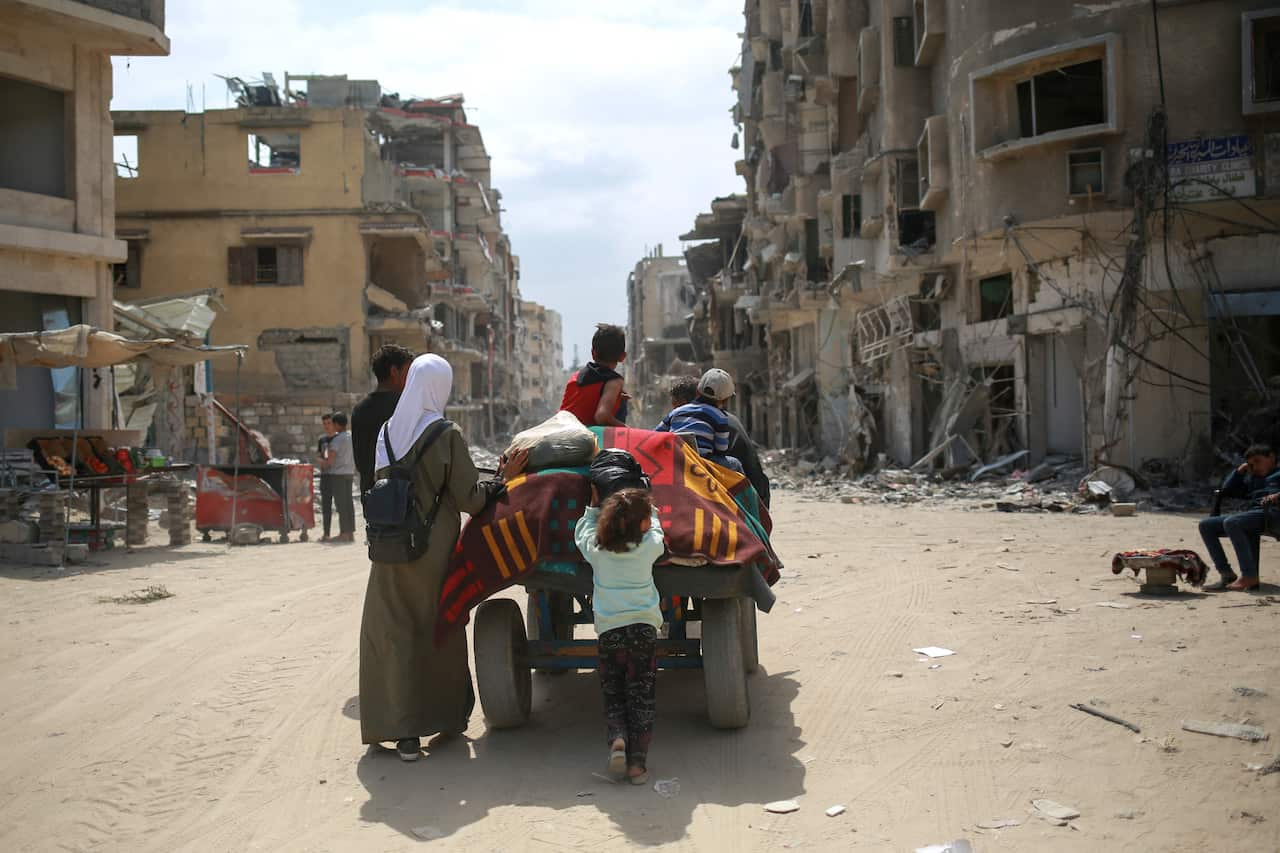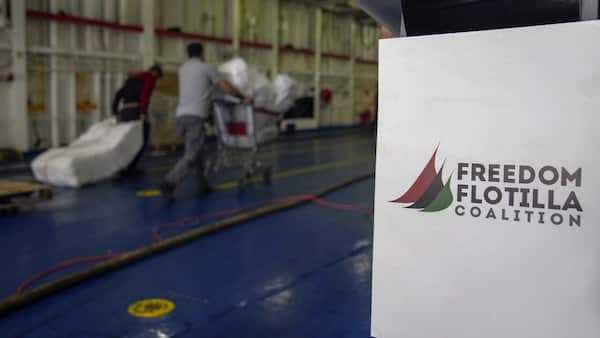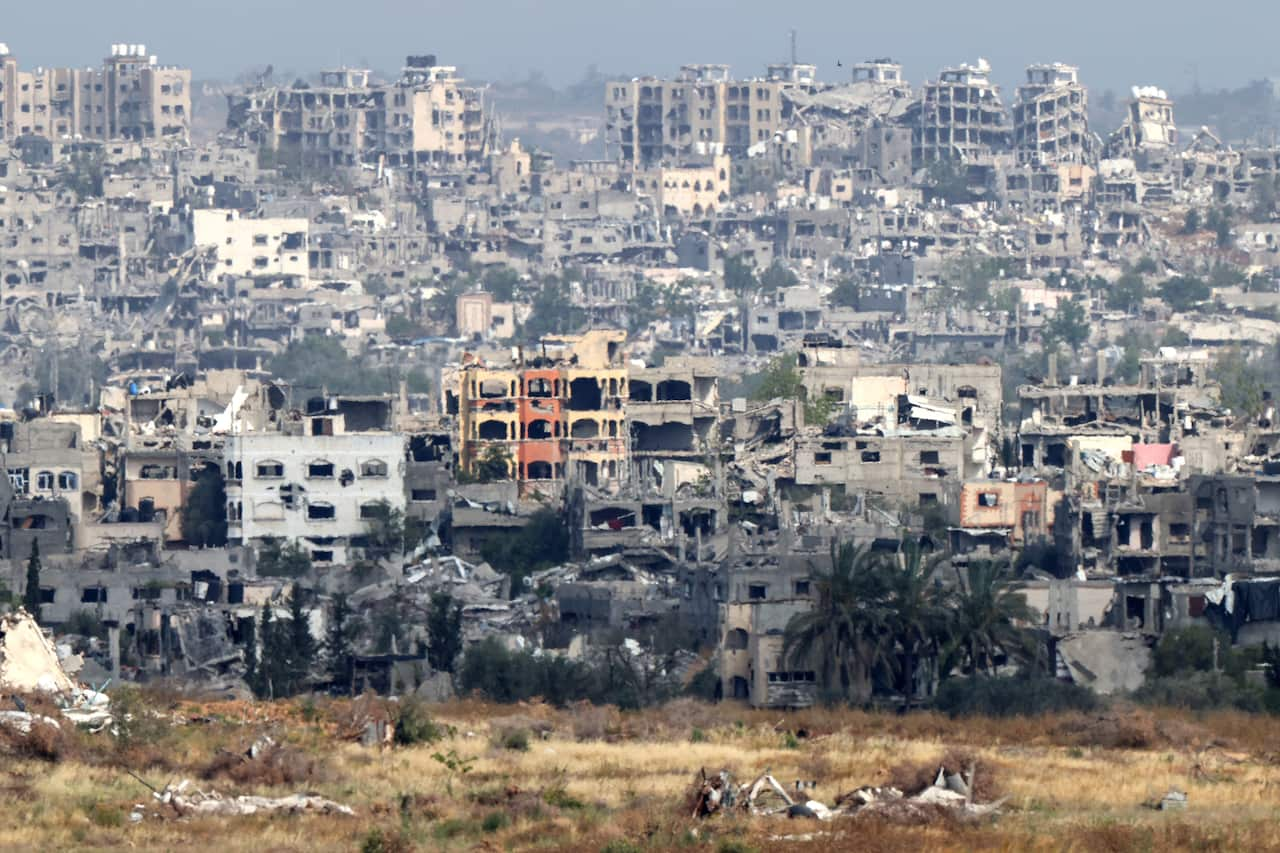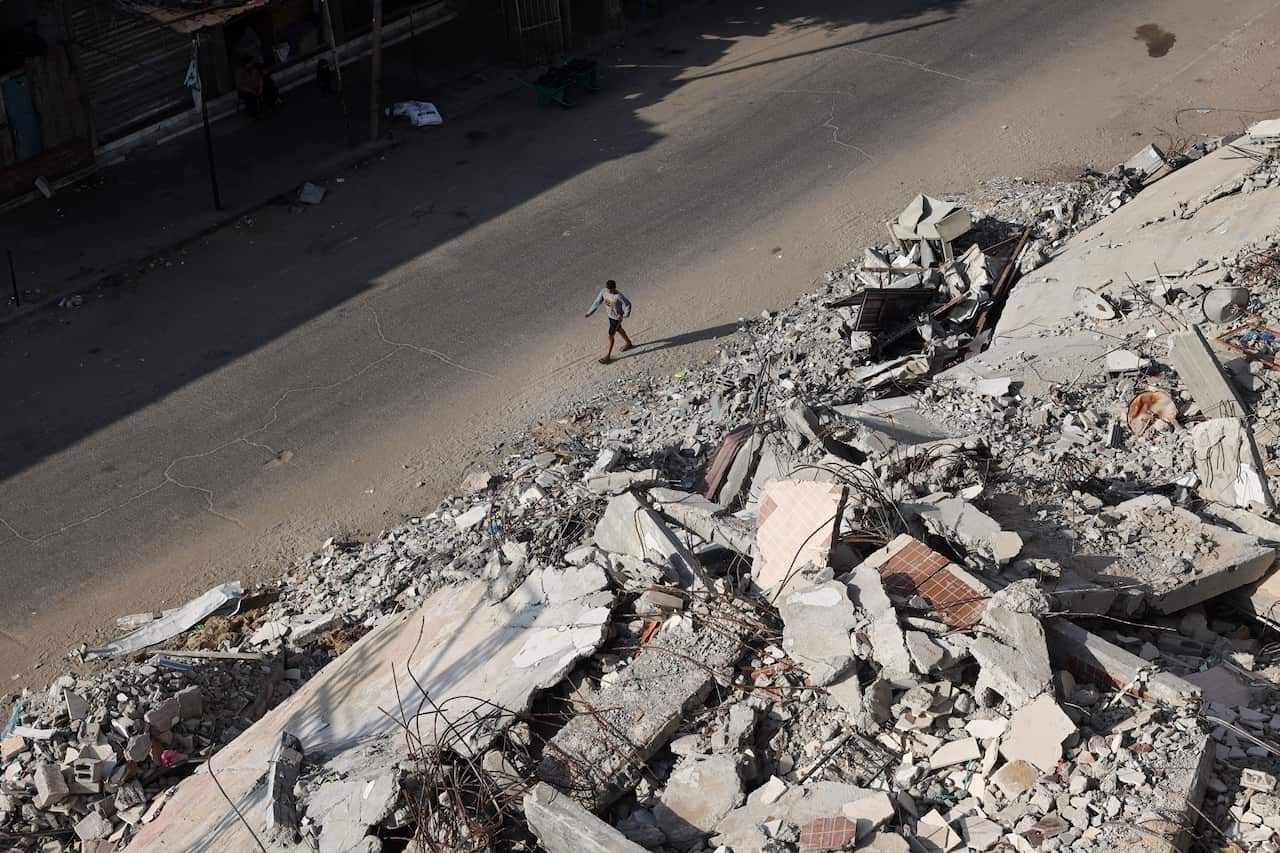The United Nations said on Thursday that Gaza’s post-war reconstruction would require an international effort unseen since the aftermath of World War Two, estimating it could cost up to $40 billion.
It came as Hamas chief Ismail Haniyeh struck an optimistic tone over a possible truce and hostage release deal, after weeks of largely stalled negotiations.
There have been reports of sticking points between the militant group and Israel nearly seven months into the war that has devastated the Palestinian territory.
But Haniyeh, head of the militant group’s Qatar-based political bureau, said in calls to Egyptian and Qatari mediators that Hamas was studying the latest proposal with a “positive spirit”.
Much of Gaza has been reduced to a grey landscape of rubble, and the United Nations estimated the cost of reconstruction at between $30 billion and $40 billion.
A UN spokesperson has said 72 per cent of all residential buildings in Gaza have been completely or partially destroyed. Source: Getty / AFP
“The scale of the destruction is huge and unprecedented… this is a mission that the global community has not dealt with since World War Two,” assistant secretary-general Abdallah al-Dardari told a briefing in the Jordanian capital Amman.
He said “72 per cent of all residential buildings have been completely or partially destroyed”.
Reconstruction is made more difficult by the presence of large quantities of unexploded ordnance that Gaza’s Civil Defence agency says triggers “more than 10 explosions every week”.
Hamas’ 7 October attack on Israel resulted in the deaths of 1,170 people, mostly civilians, according to an AFP tally of Israeli official figures.
Israel estimates that 129 captives seized by militants during their attack remain in Gaza. The military says 34 of them are dead.
Israel’s retaliatory offensive against Hamas has killed at least 34,596 people in Gaza, mostly women and children, according to the Gaza health ministry.
‘Get this done’
Mediators have proposed a deal that would halt fighting for 40 days and exchange Israeli hostages for potentially thousands of Palestinian prisoners, according to details released by Britain.
An Israeli official not authorised to speak publicly said Israel was still waiting for Hamas’ formal response to the latest proposal.
Before Haniyeh’s comments on Thursday, Hamas officials had given it a generally negative reception.
Senior Hamas official Osama Hamdan told the Agence France-Presse late on Wednesday that the movement’s position on the proposal was “negative” for the time being.
Another senior Hamas official, Suhail al-Hindi, said the group’s aim remained an “end to this war” — a goal at odds with the stated position of Israeli Prime Minister Benjamin Netanyahu.
But the militant group has come under intense pressure from mediators to accept the latest offer.
“Hamas needs to say yes and needs to get this done,” US secretary of state Antony Blinken said in Israel on Wednesday.
Mounting criticism
Following talks with Blinken, Israeli opposition leader Yair Lapid said Netanyahu “doesn’t have any political excuse not to move to a deal for the release of the hostages”.
Regardless of whether a truce is reached, Netanyahu has vowed to send Israeli ground troops into Rafah, despite US opposition to any operation that fails to provide protection for the 1.5 million civilians sheltering in Gaza’s southernmost city.
“We will do what is necessary to win and overcome our enemy, including in Rafah,” he pledged at a cabinet meeting on Thursday.
Separately, Netanyahu told a delegation of Holocaust survivors that Jews should welcome but not expect non-Jewish support and should be ready to “stand alone”.
“If it is possible to recruit Gentiles, that’s good. But if we don’t protect ourselves, no one will protect us,” he told them.
Netanyahu faces regular protests calling on him to make a deal that would bring home the remaining captives.
The United Nations has estimated the cost of Gaza’s post-war reconstruction will be between $30 billion and $40 billion. Source: Getty / Jack Guez/AFP
On Thursday, protesters set up over-sized photographs of women hostages outside Netanyahu’s Jerusalem residence. In Tel Aviv, they again blocked a highway.
Criticism of the war has also intensified in the United States, Israel’s top military supplier.
Demonstrations have spread to at least 30 US universities, with some protesters erecting encampments to oppose Gaza’s rising death toll.
Israeli President Isaac Herzog slammed the protests, saying that US universities had been “contaminated by hatred and antisemitism”.
US President Joe Biden said the United States was “not an authoritarian nation where we silence people”, but added that antisemitism had “no place” on US campuses.
A mother’s tears
In response to US pressure, Israel has allowed increased aid deliveries into Gaza in recent days, including through a reopened crossing.
But UN aid chief Martin Griffiths said that “improvements in bringing more aid into Gaza” cannot be used “to prepare for or justify a full-blown military assault on Rafah”.
At south Gaza’s largest hospital, the Nasser Medical Complex in Khan Younis, which was heavily damaged by fighting in February, foreign aid and borrowed equipment has helped to “almost completely” restore the emergency department, its director Atef al-Hout said.
Witnesses and an AFP correspondent reported airstrikes on Khan Younis on Thursday and shelling in the Rafah area, while militants and Israeli troops battled in Gaza City.
Airstrikes were reported in the southern Gaza city of Khan Younis this week. Source: Getty / AFP
Palestinian advocacy groups said Thursday that Dr Adnan Ahmed Atiya al-Barsh, orthopaedics chief at Al-Shifa hospital, Gaza’s largest, died last month in Israeli custody, and alleged he had been tortured.
Israel’s military told AFP it was “not aware” of such an incident.
In north Gaza, workers unloaded aid at Kamal Adwan Hospital where Alaa al-Nadi’s son lay motionless in the intensive care unit, his head swathed in bandages.
Nadi, who was also wounded, said she feared the hospital’s power might go out, cutting his oxygen and killing him.
“I call on the world to transfer my son for treatment abroad. He is in a very bad condition,” she said, breaking down.





I believe that the international community must come together to support the reconstruction efforts in Gaza. The scale of destruction is truly heartbreaking, and it is essential that we provide the necessary resources to help the people of Gaza rebuild their lives.
It is heartbreaking to see the devastation in Gaza. The international community must come together to support the reconstruction efforts and help the people of Gaza rebuild their lives. The enormity of this task reminds us of the challenges faced during World War Two, and it’s crucial that we act swiftly and decisively to provide aid and assistance.